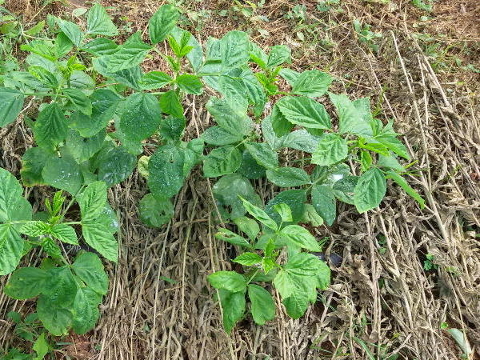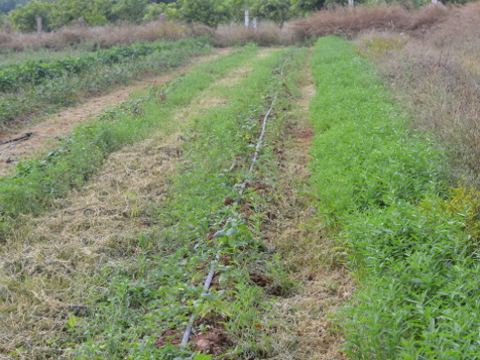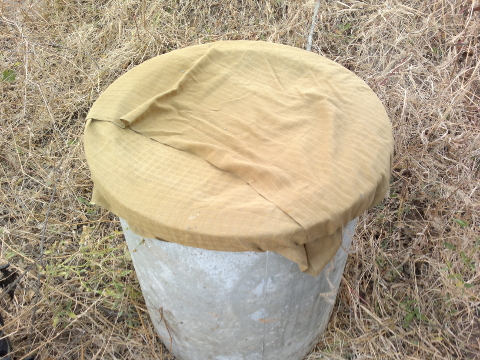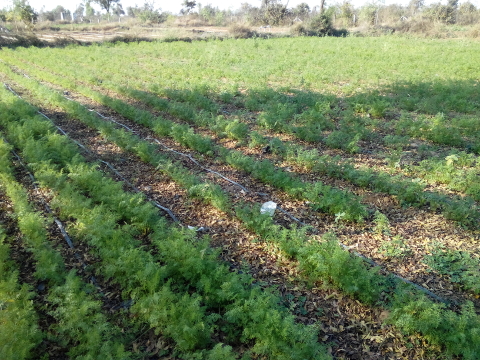
The cornerstone of organic farming is building rich, healthy soil that forms the basis of healthy, nutritious crops.
At NaturePinks, we treat soil as a living dynamic medium that provides nutrition and substrate for the crops we grow. Our consistent efforts are to build fertile soils rich in organic matter and humus and to this end, we encourage soil natural flora and fauna to flourish.
All crops need a number of nutrients for their growth – modern agronomy recognizes 16 nutrients that plants require while there is ongoing research on the number. Plants obtain a few of these nutrients from the atmosphere and all the rest from soil. Hence we ensure our soils are rich in organic matter and alive with beneficial microorganisms. These vital organisms break down nutrients to make them available to plants, making the soil more fertile and helping control soil-based plant pathogens. Fields high in organic matter have less soil erosion, retain water better, and release nutrients more slowly into the soil for natural, healthy plant growth. Apart from microbes, earthworms play a major role in recycling soil nutrients by churning them from the deeper layers.
Our methods for soil management include:
Manures & Organic Compost
We continually add significant amounts of manures and compost from plant and animal sources. Some of our current sources include farm yard manure (from cattle), vermicompost and neem cake. We obtain these from a number of different trusted sources.
Cover Crops and Mulching
We grow a number of cover crops and use the crop growth to mulch the inter-row and inter-plant areas. Most of these crops are fast growing nitrogen fixing plants – Janumu/Sunnhemp, Cowpea, Redgram, Greengram, Horsegram etc. When mulched, these crops provide the additional benefit of conserving soil moisture, reducing weed growth and even reducing pest pressure.
Green Leaf Manure
Our farms are dotted with a variety of trees on the borders and bunds. The leaves dropped from these trees form a decent source of organic matter for the farm and together with the cover crops we sow, are the source of green leaf manure.
Crop Rotations
At NaturePinks Gardens, we grow a range of crops and rotate the crops across seasons and the plots where they are grown. This helps build the soil nutrients given different crops have different nutrient requirements and several crops also have the ability to enrich the soils with specific nutrients. A side effect of crop rotation is a reduction in pest pressure due to breakage of pest life cycles and the ability of some crops to suppress specific pests.
Fixing and Solubilizing Microbes
In addition to encouraging the natural ecosystems to thrive, we also apply inoculum of a range of beneficial micro organisms. Some of what we add include Rhizobium cultures that form symbiotic relationships with legume crops to fix nitrogen, nutrient fixing bacteria and nutrient solubilizing bacteria. These microbes speed up the fixation of nutrients and convert the soil nutrients into forms that plants can absorb.
Native Cow based Preparations
Desi cow has been a inherent part of Indian agriculture and is recognized for providing materials that help in soil and plant health. We source desi cow dung and urine from nearby villages and goshalas for use in a variety of organic input preparations such as Panchagavya and Jeevamrutha, which we use for fertility and pest management. We have a few desi cattle on our farms.
Substances defined by Organic Standards
Organic Standards (NPOP, IFOAM) define a list of substances that may be used in organic production systems along with their compositional requirements and conditions for use. These substances are categorized into (i) Plant & animal orgin (ii) Mineral origin (iii) Microbiological and (iv) Others. At NaturePinks, we adhere to these laid down standards when supplementing the soils with external inputs.
More on our farm management
Soil Management at NaturePinks
Pest Management at NaturePinks
Weed Management at NaturePinks


